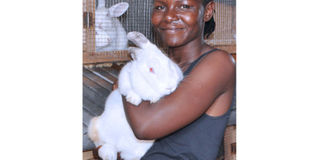Inside Aleng’s rabbit meat processing farm

Grace Blessed Aleng
Commercial rabbit farming in Uganda remains overshadowed by piggery, cattle, goat and poultry farming. The 2008 livestock census report shows there were about 0.37 million rabbits in Uganda, 81 per cent of them indigenous.
However, rabbit farming is a lucrative venture, globally. But not many Ugandans have embraced it. When Grace Blessed Aleng started rearing rabbits, she also later got an idea of adding value to rabbit meat. Today, her business-Vert Fields Limited, has grown from rabbit breeding, processing of rabbit meat to doing agricultural consultancy.
Starting out
Months after Aleng had had a rabbit meat meal in Nebbi District, she was inspired to start supplying rabbit meat to clients and shops around Kampala.
“People like rabbit meat but many do not know where to access it. Corporates could not access it in the supermarket, hotels and that is why I decided to do value addition,” Ms Aleng says.
Uganda Industrial Research Institute (UIRI) was her next point of engagement and there, her idea was incubated. Eight months into 2014, she recorded her first business milestone.
“I applied to do value addition and up to now, UIRI still provides space for people who process rabbit sausages, burgers, smoked spicy meat.” Ms Aleng says, “I had networks so I was invited to exhibitions. I started supplying to hotels like Africana, supermarkets like Mega Standard, and other clients.” Since she put the first rabbit sausages on the market, her typical clients have been the upper class who maintain a healthy lifestyle.
Dealing with attitudes
Rabbits are considered sweet, tender animals only kept as pets in some societies. This is the perception people in the business of rabbit meat have to deal with everyday. What has made, Aleng’s Vert Fields grow, is her persistent marketing drive, quality products and acting on feedback from customers.
In 2015, she supported and empowered 75 farmer groups in northern Uganda who are today supplying rabbit meat within the region.
“For any business to grow, it takes time. When I started, many mocked my business idea. Many thought I would not find market for rabbit products,” says Aleng, adding that, “My vision is to interest people in rabbit farming. Apart from its health benefits, the multiplier effect is higher in rabbits than rearing other animals. The gestation period is 30 days and rearing rabbits is not cumbersome,” she says.
Lessons learnt
Aleng says she has had to change her book keeping habits. “Procrastination has always been a big challenge. Lack of audited books has cost me some funding opportunities. I have learnt to keep my financial books updated. I pay myself a salary to ensure personal money is separated from the business money.”
On average, the company walks away with a profit of Shs900,000 per month. So far, it has raised funds from its savings and partners.
Her message to women interested in business is to believe in their abilities and only listen to encouraging talk.
Future
Rabbit meat and its products cost between Shs20,000 and Shs35,000 a kilogramme. The choice of products was informed by demand, shelf life and the possibility of constant supply. Besides the current products, there is still room for growth within the processing line. I am planning to introduce German sausages, the Bratwurst and the Frankfurters.




